LATEST INSIGHTS
Your Present Location: LATEST INSIGHTSMore than 2.6 million people listened, Macro Situation Annual Forum (Summer 2022)speaks through the world, the times, the changes in history
Macro Situation Annual Forum (Summer 2022)
Changes, Reshaping and Development: China and the World
More than 2.6 million people listened, Macro Situation Annual Forum (Summer 2022) speaks through the world, the times, the changes in history
From July 16th to 17th, 2022, Macro Situation Annual Forum (Summer 2022) hosted by Chongyang Institute for Financial Studies, Renmin University of China (RDCY) was held in Beijing, organized by Global Governance Research Center, Renmin University of China (GGRC), China-US People-to-People Exchange Research Center, Renmin University of China and Jufeng Financial Research Institute, supported by Beijing Jufeng Finance Technology Co., Ltd, New Economist and GF60 (Green Finance 60 Forum). The theme of this forum is "Changes, Reshaping and Development: China and the World". Professor Wang Yi, Vice President of Renmin University of China, Qiu Xiaohua, former Director General of the National Bureau of Statistics and Chief Economist of Jufeng Investment, gave opening remarks. Liao Qun, Chief Economist of the RDCY and Chief Expert of the GGRC, released the think tank research report "Adhere to Development First: Positioning of China's Economic Development Concept under Two Overall Situations". More than twenty former dignitaries, well-known experts and scholars from home and abroad, industry leaders and chief economists in the financial industry gathered together to interpret the current macro situation, discussed the future prospects of world economy and gave advice on China's economic development. More than 2.6 million people watched the live broadcast online. Xinhua News Agency, Peoples Network, Economic Daily, Securities Daily, Securities Times, Beijing Daily, SZTV and many other media reported this forum.
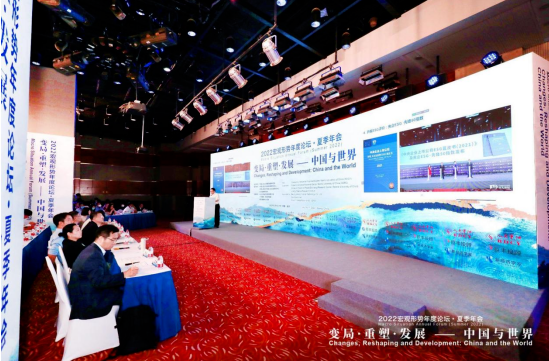
The summer annual meeting of the Macro Situation Forum lasted for two days and consisted of four plenary sessions. At the plenary session of "The World and China: The Future of Competition and Cooperation" on July 16th, 2022, Professor Wang Yi, Vice President of Renmin University of China (RUC), delivered an opening speech. He said that Renmin University of China is an important research center of Chinese philosophy and social sciences. Since its establishment, RUC has always paid attention to the fundamental questions of the future of human society. At present, it is striving to build China’s important talent center and innovation highland in the field of humanities and social sciences research and teaching, and to build a world-class university with Chinese characteristics. RDCY is a key think tank built by the university, and is now dedicated to answering the two questions of "what is going on with the world" and "humanity where to go". He believes that in the face of numerous difficulties and challenges around the world, we must see the positive factors of solidarity and cooperation among countries in the world, and strive to build a new development pattern. It is hoped that all the distinguished guests will show their insights and work together to take the pulse of the world economy and contribute to the steady and long-term development of China's economy.
Then, Mr. Qiu Xiaohua delivered a speech. He said that the theme of "Changes, Reshaping, Development - China and the World" fits the development opportunities and thinking of breaking the situation faced by China under the current situation of great changes unseen in a century. The current world politics and economy present a variety of new problems. How can China ensure the realization of the goal of stable growth in a turbulent world? How to break the situation in the second half of the year, and how to achieve the annual growth rate target of about 5.5% through digitalization, green innovation, new infrastructure, and new dymamic energy development? These questions prompt us to discuss the macro conditions and macro policies at such a point in time. He believes that through joint efforts, the Macro Situation Forum can continue to give full play to the advantages of macro force research, make the results of thinking and collision stand at the forefront of the times, make the macro trends clear in the mind, realize the preconceivedness, break the predicament, seek development, and let the Chinese values are recognized by the world.
The opening ceremony was presided over by Prof. Wang Wen, Executive Dean of RDCY, Executive Director of GGRC, and Executive Director of the China-US People-to-People Exchange Research Center (Ministry of Education).
In the keynote speech session, Long Guoqiang,Vice President of Development Research Center of the State Council of China, Grzegorz W. Kolodko, Former Minister of Finance of Poland; Director of Transformation, Integration and Globalization Economic Research, Kozminski University, Poland, Qiu Xiaohua, Former Director General of National Bureau of Statistics; Chief Economist of Jufeng Investment, John Ross, Former Director of Economic and Business Policy for the Mayor of London, UK; Senior Fellow of RDCY, gave keynote speeches successively.
Long Guoqiang believes that at present, China should properly respond to the challenges brought about by the new changes in the world economy, accurately grasp the profound changes in the international economic landscape, and need to take the initiative to strive for new opportunities and new situations. China's development is inseparable from the world, and the world's prosperity also needs China. In the future, China will always adhere to the concept of a community with a shared future for mankind, and work hand in hand with the international community to promote joint construction and open up the world economy.
In the next 20 or 30 years, RMB will play an increasingly important role in this market, Grzegorz W. Kolodko said. This is conducive to sustainable development, diversified development and global trade balance. In this era, we don't need any world hegemony, what we really need is peaceful and rational coexistence of countries, which is based on consensus, cooperation and a pragmatic international exchange system. The global reserve currency system should be a tool to achieve this goal, not the target itself.
Qiu Xiaohua emphasized that starting from 2022, we have been restrained by three forces, one is the recurrence of the epidemic; the other is the high inflation; and the third is the Russia-Ukraine conflict. These three restraining forces have affected the development of the world and the stability of the world. But at present, China's foreign trade is still resilient. As long as the world economy does not experience a serious recession, China's foreign trade can maintain stable growth. Taken together, the Chinese economy in the second half of the year must be significantly higher than that of the first half of the year.
John Ross believes that the world economic situation is deteriorating significantly, with slowing growth and high inflation being the elements of economic "stagflation". And China will also have to be affected by negative global trends. Therefore, it is necessary to clearly understand the reasons for the deterioration of the world economic situation. He believes that the reason behind the deterioration of the global economy lies in the United States. The U.S. stimulus package focused on consumption has had devastating consequences for the U.S. and the world economy as a whole.
Subsequently, Liao Qun released the No.4 issue of Telling the Story of China's Economy and Finance Report Series, with the report theme of "Adhere to Development First: Positioning of China's Economic Development Concept under Two Overall Situations". He introduced that the report starts by discussing the dialectical relationship between development and stability, and clarifies that development is a requirement of the times imposed on China by history, and China must still insist on putting development first in economic construction in the future. The report believes that if we want to successfully achieve the great rejuvenation of the Chinese nation in the context of great changes unseen in a century, China must correctly handle the order of development and stability, insist on putting development first, and continue to ensure medium-to-high-speed economic growth and high-quality development, and strive to complete the economic revival sprint within the next 30 years. The report discusses the necessity and achievability of China's economic revival sprint from three perspectives: current development needs, conditions and risks. The great rejuvenation of the Chinese nation has an extremely bright prospect.
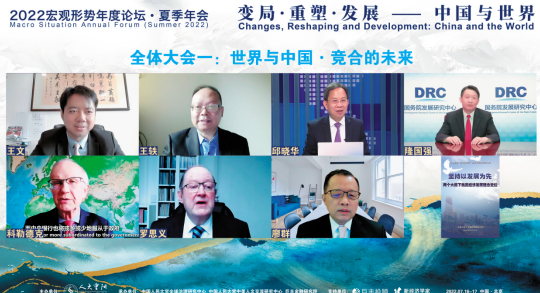
At the second plenary session on the afternoon of July 16th, "ESG Development and Dual Carbon Strategy - for a Better World", Zhong Hongwu, Professor of Chinese Academy of Social Sciences; Secretary General of China Social Responsibility 100 Forum (representing the SASAC ESG Research Group), Li Lihui, Former President of Bank of China, Wang Naixiang, Chairman of China Beijing Green Exchange, Liu Meng, Asia-Pacific Regional General Representative of United Nations Global Compact (UNGC), Zhang Junjie, Chief Economist of GF60; Director of the Initiative for Sustainable Investment (ISI), Duke Kunshan University, Chiu Tzu-Kuan, Professor of Shanghai Advanced Institute of Finance, Shanghai Jiaotong University; Academic Director of the Special Fund for Sustainable Finance Discipline Development, Sun Weiwei, Director of Digital Communication Integration Development Department of People's Daily, Li Xiaojia, Founder of Micro Connect; Former CEO of Hong Kong Exchanges and Clearing Limited, gave keynote speeches successively.
Zhong Hongwu shared the current status, challenges and future actions of ESG in state-owned enterprises to the guests. He believes that, on the one hand, Western countries hold the ESG discourse and suppress the central enterprises that “go out”, and the results of ESG ratings of central enterprises by overseas rating agencies are systematically low; on the other hand, the level of improvement and information disclosure needs to be improved. He hopes that industry experts can jointly build China's ESG system in the future to win the international discourse.
Li Lihui believes that digital RMB is a new opportunity for the development of the green finance industry, and should be taken into account by financial institutions and enterprises that can afford it. The digital RMB will change the pattern of the payment market. Whether it is used in the domestic carbon emissions trading market or as a currency instument for international green financial product transactions, it is a new opportunity and may creat a new radioactive blue ocean effect.
Wang Naixiang said that through the synergy of the three dimensions of environment, society and governance, ESG can create positive value for financial investment institutions, enterprises, society and other aspects, and can make positive contributions to answering the question of the times of where human beings are going and building a better world. At the same time, he also shared with the guests the relevant measures that Beijing Green Exchange will take in the future to serve the green, low-carbon and high-quality development of the economy and society.
Liu Meng introduced the work carried out by the United Nations Global Compact in ESG-related fields, and said that we need to revisit Chinese culture from ESG concepts, and find cultural confidence in the ESG. As an UN official, it is our bounden duty to preach ESG, to preach the ten principles of the Global Compact, to preach business for good, to unite global enterprises, and to jointly build a better world.
Zhang Junjie introduced some of the current difficulties in ESG investment and the problems that can be seen from the data to the guests, and presented the research results of his team in ESG. He said that as the overall society pays more attention to ESG gradually, the relationship between ESG and corporate performance is showing a positive correlation. As ESG investment gets more attention, there is important work to be done, both in terms of improving evaluation systems and optimizing ESG investment strategies.
Chiu Tzu-Kuan shared her observations on the risks and challenges of ESG investment with the guests. She said that green finance is basically a goal-oriented finance, which is concerned not only with traditional risk-reward, but also whether the investment can drive social progress. In other words, our investors are very concerned about the ESG impact of investment. Although today is an era of drastic changes, this era also brings rich opportunities for the theory and practice of ESG investment.
Li Xiaojia said that a very important part of the ESG strategy is to enable labor entrepreneurs to drive employment and common prosperity in the capillaries of the economy, so that our finance can truly integrate into the depth of the economy. This is a dream of our industry. We are on the way, already in practice, and are basically sure that this road can be passed through and popularized. He hopes that everyone can participate in together.
Sun Weiwei made a sharing entitled "Seeing the Value Engine of ESG Dissemination of Sustainable Development". She believes that, as an important carrier for companies to communicate with stakeholders, effective ESG information disclosure can reduce risks for companies. The purpose of strong ESG communication is not only to demonstrate value to investors, but also to gain recognition and support from the government, customers, employees, media and the public.
In the roundtable forum, Chen Ying, Deputy Director of the Center for Sustainable Development, Chinese Academy of Social Sciences, Zheng Nanlei, Deputy Director of Shenzhen Stock Exchange Research Institute (Financial Innovation Lab), Zhang Junjie, Chief Economist of GF60; Director of the Initiative for Sustainable Investment (ISI), Duke Kunshan University, Li Xinxing, Representative of the European Bank for Reconstruction and Development in China discussed the issue of “ESG Development and Dual Carbon Strategy”, which was moderated by Liu Jintao, Deputy Project Manager of the Center for Eco-Financial Studies, Chongyang Institute for Financial Studies, Renmin University of China (RDCY).
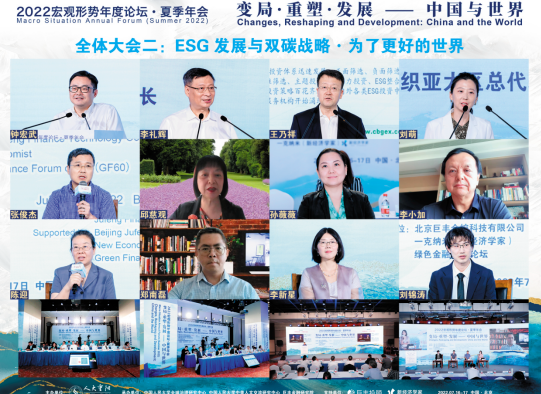
On July 17th , the third plenary session "New Economist Macro Force Forum", Wang Wen made an opening speech. He said that the current world has "five challenges in parallel": wars, virus, inflation, famine and climate change, which occurred simultaneously this year and impacted human civilization, plunging the world to into chaos. He belives that while the Western model is unable to provide solutions to this situation, China is constantly looking for solutions. Although China is currently confronted with downside pressure and risks, we believe that it is still the world's largest force for changes, reshaping and development. And China will give its answer to this situation.
In the keynote speech session, Gao Peiyong, Vice President of the Chinese Academy of Social Sciences, Zhu Guangyao, Former Vice Minister of the Ministry of Finance, Shi Jianzhong, Vice President of China University of Political Science and Law, Li Daokui, Director of the Institute for Chinese Economic Practice and Thinking, Tsinghua University (ACCEPT), and Peng Wensheng, Chief Economist of China International Capital Corporation gave their speeches respectively.
Gao Peiyong shared his insights with guests on how to clearly understand and describe the Chinese economy. He said that the fundamental and general trend of China's long-term stable economic development is not only determined by the economic level, but also by the broad perspective of its unique history, culture, and national conditions. Besides, it is important to find the source of the trend from the great traditional Chinese culture. We should have full confidence in the performance of Chinese economy in the second half year and the future.
Zhu Guangyao emphasized that the current global economy is facing rapid downward pressure, and the great risk of slipping into recession. We must be vigilant about the outbreak of the international debt crisis caused by the global economic recession. Under such special challenges, it is crucial for China to maintain stable and sustainable economic development. We must fully implement the new development philosophy, adhere to the general policy of seeking progress in a stable manner. The pandemic must be prevented, the economy must be stabilized, and the development must be guaranteed.
Shi Jianzhong mentioned that competition without innovation is just a zero-sum game. In order to create a better market environment for innovation, we have to build a unified national market. In the process of its construction, we need to use the rule of law, especially the power of the Anti-Monopoly Law, to make the market more efficient, the government more effective, the competition more fair, and the innovation more prosperous.
Li Daokui analyzed the impacts of the current international situation on China, and pointed out measures that China has taken to deal with economic difficulties in three aspects. In order to cope with profound changes unseen in a century and the pandemic, he called on China to not only improve macro policies and investments, but also to seriously reshape our reform mechanism, especially "government and market economics".
Peng Wensheng discussed issues related to economic restart and reconstruction after the epidemic. He said that in this round of China's economic reboot, in terms of adequate macroeconomic policies, fiscal and monetary synergy is our new direction, especially delivering of the central bank's profits. The risks we face are mainly two non-economic factors. One is the Covid-19 epidemic, and the other is geopolitics, especially the impact of the Russia-Ukraine conflict.
In the subsequent round table forum, He Keng, Deputy Director of The Financial and Economic Affairs Committee at The National People's Congress (NPC); Lian Ping, Chief Economist of Zhixin Investment, Yao Yudong, Chief Economist of Dacheng Fund, Shao Yu, Chief Economist of Orient Securities, Feng Qiaobin, Vice Minister of Macroeconomic Research Department, Development Research Center of the State Council, and Chen Daofu, Deputy Director of Financial Research Institute, Development Research Center of the State Council, discussed the macroeconomic situation in the first half year and the macroeconomic outlook in the second half year. The round table forum was moderated by Li Meicen, Chief Strategy Analyst, Caitong Securities.
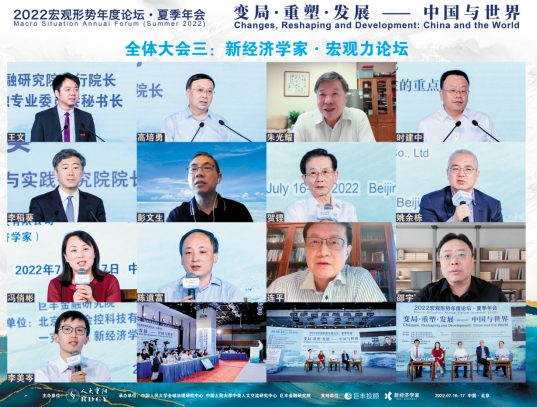
At the fourth plenary meeting on the afternoon of July 17th, "Discovering the Value of China", Li Yizhong, Former Minister of Industry and Information Technology; President of China Federation of Industrial Economics, Wu Shichun, Founding Partner of Meihua Venture Capital, and Wu Chaoze, Director of China Securities Research Institute; Chief Analyst of TMT Industry, gave keynote speeches respectively.
Li Yizhong said that today's world is undergoing profound changes unseen in a century, the national economy is facing triple pressure, and the frequent outbreak of the epidemic has brought trouble to the economy and society. At present, it is imperative to stabilize the economy. Chinese enterprises should conform to the overall situation, follow the general trend, obey the overall pattern, and create value in the development; deepen the enterprise reform, break the shackles, transform the system, plan for the future, and enhance the company's value through reform. The law-abiding integrity, code of conduct, and information transparency are where the company's goals and social values lie.
Wu Shichun shared with guests 100 tips for entrepreneurship after the epidemic. He emphasized that the eight point of ambition, flexibility, management, making money, defense, balance, cooperation, and life are the keys to entrepreneurship. When starting a business, we should observe the world from perspectives of idealism and realism, and maintain an unbiased perspective on the world. The goal of entrepreneurship is to create values for the country, society and market. It only makes sense when we are walking on the path of entrepreneurship with correct values.
Wu Chaoze mentioned that the digital economy will have a profound impact on the overall production and life in the next 10 years. She also shared with the guests five major trends in the future development of the digital economy. She deems that in the next 10 years, the entire industry will move from informatization and networking to digitization and intelligence; the focus of investment will move from new infrastructure to new applications; the value of the industry will move from terminals to the cloud; the focus of applications will move from ToC to ToB, and the supply chain will move from efficiency first to safety first.
At the subsequent round table forum, Li Feng, Founding Partner of Fengrui Capital, Zhou Wei, CCV Founding Partner; Former Managing Partner of KPCB China, Wu Shichun, Founding Partner of Meihua Ventures, and Fan Weifeng, Founder of Gaozhang Capital conducted a discussion, moderated by Zhang Lulu, Managing Director of China Construction Investment Group Construction Investment/ Construction Investment Huawen Investment Co., Ltd.
Huang Qifan, Former Mayor of Chongqing, delivered a closing speech. He said that since the beginning of this year, affected by multiple factors such as the impact of COVID-19 pandemic, Russia-Ukraine conflict, and high inflation in major developed countries, the recovery and growth of the world economy have suffered serious setbacks, and global systematic economic and financial risks have been constantly accumulating. At present, China’s economy is also facing triple pressure of demand contraction, supply shock and weakening expectations. In this context, only by conscientiously managing our own affairs and promoting high-quality development can we effectively hedge against various risks and challenges and truly promote the realization of two general situations. He emphasized that the period from now to 2035 is a critical stage of profound changes unseen in a century. As long as we firmly grasp this major opportunity, concentrate on running our own affairs, and insistently grasp three major events of reform, opening up and innovation, we will not be distracted by the impacts of the pandemic, the Russian-Ukraine conflict, geopolitical competition, and even the oppression of some countries.
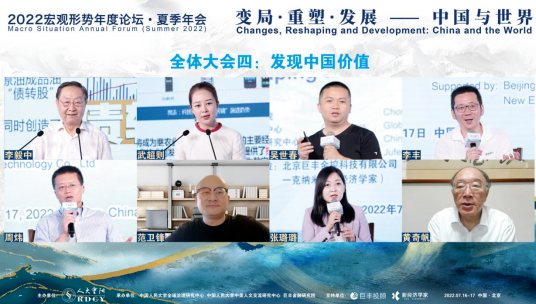
The Macro Situation Forum is a series of forums hosted by the Chongyang Institute for Financial Studies, Renmin University of China. So far, many large-scale events have been held, aiming to invite experts and scholars from various fields to discuss how to grasp changes of the world, gain insights into the context of times, and explore the future development path. The Macro Situation Forum has been officially included in the "14th Five-Year" planning construction list of Renmin University of China, and has become an important brand activity of Renmin University of China in the field of think tanks.
Key Words: RDCY, Fourm























































































 京公网安备 11010802037854号
京公网安备 11010802037854号





